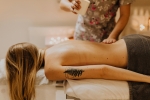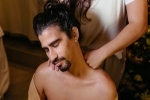Home »
Blog » Pain Management
| Stem Cell, PRP, Acupuncture in Queens & Long Island, New York
Pain Management | Stem Cell, PRP, Acupuncture in Queens & Long Island, New York
In children, arthritis does not typically occur due to wear and tear or overuse of the joints, as it can in adults. More typical in children is inflammatory arthritis, in which the body’s immune system causes inflammation in a joint or multiple joints. Inflamed joints may be painful, stiff, or swollen. Inflammatory arthritis in children, known as juvenile idiopathic arthritis (JIA), occurs more frequently than you might think and is estimated to affect nearly 300,000 children in the United States, according to the Arthritis Foundation.
Read more
Manipulation of the cervical spine or neck region is a common technique utilized by doctors of chiropractic for many patients complaining of neck, upper back, and shoulder/arm pain, as well as headaches. Similar to the treatment for many conditions affecting the lower back, chiropractic is considered a first line of treatment for a range of cervical spine conditions.
Read more
A cervical epidural steroid injection is a shot to relieve chronic pain. The shot goes into a space near the spine and has anti-inflammatory effects. It’s best for pain that’s the result of nerve injury or damage. Cervical epidural injections may have to be repeated for ongoing pain relief. Insurance and some government programs may cover the costs. The out-of-pocket expenses for those without coverage are similar to the costs of conservative pain treatment.
Read more
For people living with arthritis, it can be tough to balance completing your daily chores around the house while keeping your condition in check. Making modifications to your everyday activities, whether it’s by using proper joint mechanics or different devices or tools, is a great way to begin. Coming up with an at-home management program -- and sticking with it -- can help you get through the day with less arthritis pain.
Read more
Myofascial release (MFR) therapy focuses on releasing muscular shortness and tightness. There are several conditions and symptoms that myofascial release therapy addresses. Many patients seek myofascial treatment after losing flexibility or function following an injury or if experiencing ongoing back, shoulder, hip, or virtual pain in any area containing soft tissue.
Read more
Cervical radiculitis (cervical radiculopathy) happens when something presses up against one of the nerve roots near the top of your spine. This pressure is usually caused by a herniated or worn vertebral disc. Cervical radiculitis, sometimes called cervical radiculopathy, happens when a nerve in your upper spine is pushed on or inflamed. Informally, it’s usually called a pinched nerve in your neck.
Read more
Myofascial therapy relieves soft tissue restrictions that cause pain. Some causes of chronic myofascial pain or low back pain are easier to diagnose than others: trauma (such as a car accident or fall), cumulative posture misalignment or mechanical deficits, a compressed nerve from a herniated disc, or inflammatory conditions.
Read more
Many patients arrive at their first physical therapy appointment expecting to receive hot packs, ultrasounds, and instructions on how to complete a series of exercises. These modalities are warranted in many instances and most therapists would agree that exercise is needed to help restore muscle imbalances. However, many therapists now approach the restoration of function from a different perspective.
Read more
The Achilles tendon is the strongest tendon in the body, linking the heel bone to the calf muscle. Problems with the Achilles are some of the most common conditions seen by sports medicine doctors. Chronic, long-lasting Achilles tendon disorders can range from overuse injuries to tearing of the tendon. Pain in the heel is often caused by a combination of both acute and chronic problems. These include inflammatory conditions – such as chronic Achilles tendonitis, paratenonitis, insertional Achilles tendonitis, and retrocalcaneal bursitis – as well as the degenerative condition known as tendinosis.
Read more
Physical therapy for lower back pain comprises a combination of strengthening, stretching, and core-building exercises that aim to: Activate and train the muscles surrounding the spine to provide better support and stability to the lower back, Foster healing in the spinal tissues to reduce pain, improve balance, and restore mobility. The exercise regimen typically starts with fewer repetitions and sets, working up to more repetitions as strength begins to build in the lower back.
Read more
Love this Post? Spread the World
























